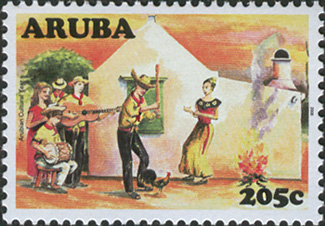Dera Gai
The Festival of San Juan Dera Gai takes place in Aruba on the night of June 23rd through the 24th. "Dera Gai" means "Bury the Rooster". There was an old native tradition to bury a live rooster as an offering to the gods to thank them for the good harvest and to pray for another good crop. The rooster was buried up to the neck and blindfolded men would try to hit the rooster's head with a stick. Fires were also lit to clear the fields. The tradition is believed to originate in Southern Mexico. When missionaries came in the 1500's this ritual was combined with the festival of St. John the Baptist. The Catholics saw the tradition as symbolizing the beheading of John the Baptist while the native pagans thought the rooster's blood fertilized the ground for the next harvest.
The tradition spread to Aruba in 1862.
Today in Aruba, the feast of Dera Gai is celebrated with song and dance. Singers and dancers wear yellow and red. The yellow representing flowers and a good harvest and red for fire. The color red is also to chase away bad luck.
Fires are lit and people jump over the fire just like in St. John celebrations elsewhere.
Men are blindfolded and they try to hit a pumpkin (representing the rooster) or a fake rooster with a stick. Real roosters are no longer used for the festival. This song is sung while people try to hit the "rooster".

Dera Gai
Bury the Rooster
Dera Gai Song
Dera Gai Song
(Papiamento)
(English)
San juan ta bin san juan ta bai
san juan ta bai san juan ta bin
ata don juan t'ariba bao
cu e palo den su man
y so wowo bon mara
ta balia bai pa mate gai.
(Kor)
Dera e gai dera e gai
pa juan mate
dera e gai dera e gai
pa juan mate.
Amigo tur ban hal un banda
pa don juan por mate gai
ata don juan a mate gai
core bin el a mate.
Henter aruba arib'a bao
ta celebra fiesta di san juan
anto nos tur ta balla bai
core bin el a mate.
St. John comes, St. John goes,
St. John goes, St. John comes
Look, St. John is everywhere*
With the stick in his hand
And blindfolded
He is dancing to kill the rooster.
(Chorus)
Bury the rooster, bury the rooster
For John to kill it,
Bury the rooster, bury the rooster,
For John to kill it.
Friends all go to one side,
So St. John can kill the rooster,
There St. John killed the rooster
Run, come, he killed it.
All Aruba, everywhere
Celebrate the feast of St. John
Then we all go dance
Run, come, he killed it.
Notes
*Bel commented, "Just a detail: In Papiamento 'arriba' (up, above) is also the name for East because it's where the sun goes up from and 'abajo' (down, below) is the name for West. Then, very often, when 'arriba abajo' is used, it means 'everywhere' or 'from East to West'."

Thanks!
Thanks!
Thanks!
Thanks and Acknowledgements
Translated by Lisa Yannucci.
Many thanks to Bel Kock-Allaman at Guia de Aruba for checking the translation and commenting on the "up and down" subtlety.
Mashi danki!

























